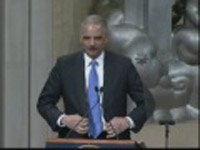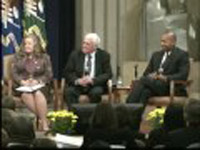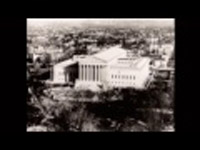Department of Justice 50th Anniversary Activities
Photos | Videos | The U.S. Attorney Community Speaks Out | In the News
Photos
50 Years Later: The Legacy of Gideon v. Wainwright, March 15, 2013
This ceremony commemorated the 50th anniversary of the U.S. Supreme Court's Landmark decision in Gideon v. Wainwright, which ensured that all indigent defendants have access to counsel. The event featured a conversation with Attorney General Eric Holder, former Vice President Walter Mondale, and U.S. Supreme Court Justice Elena Kagan, and a panel discussion with Alabama Chief Justice Sue Bell Cobb (ret.), Mr. William Leahy, and Mr. Bryan Stevenson, moderated by Ms. Nina Totenberg.
Videos

Welcome by Deborah Leff, Acting Senior Counselor for Access to Justice and Tony West, Acting Associate Attorney General. Remarks by Attorney General Eric Holder.

Play Video
March 15, 2013 Ceremony Part 2
Conversation between Attorney General Eric Holder and Vice President Walter Mondale and Justice Elena Kagan.

Play Video
March 15, 2013 Ceremony Part 3
Panel Discussion with Alabama Chief Justice Sue Bell Cobb (ret.), Mr. William Leahy, and Mr. Bryan Stevenson, moderated by Ms. Nina Totenberg. Closing Remarks by Attorney General Eric Holder.
An excerpt from Defending Gideon, a documentary film by The Constitution Project and New Media Advocacy Project, was screened at the Department's 50th Anniversary Gideon Event.
The ideals articulated in Gideon v. Wainwright are fundamental to the values of the U.S. Department of Justice and the 93 U.S. Attorneys who prosecute federal criminal cases on behalf of the United States. Our criminal justice system, and our confidence in its results, depend on effective representation for both the prosecution and defense. While all of us want to see guilty defendants held accountable for their crimes, a fair trial depends on a vigorous and thorough defense. Defendants have a right to eliminate potentially biased jurors through questioning, to effectively cross-examine prosecution witness, to find and present witnesses of their own should they choose to do so, and to present thoughtful opening statements and closing arguments. Someone untrained in the law finds himself on an uneven playing field when forced to perform all of those tasks himself against an experienced prosecutor. Our system of justice depends on an adversary system where the lawyers stand on equal footing. We can all feel more confident that justice is served when we know that defendants have access to effective lawyers to represent them.
Today, new challenges confront the indigent defense system. Budget cuts threaten to underfund indigent defense systems in some states, including Michigan, where bipartisan reform efforts are underway. The current problem is not denial of representation, as in Gideon, but of “under-representation,” which occurs when indigent defense systems are hampered by insufficient resources, overwhelming caseloads and inadequate oversight. But the truth is, an inadequate indigent defense system presents added costs to taxpayers. When the justice system fails to get it right the first time, we all pay, often for years, for new filings, retrials, and appeals, while the real perpetrator of a crime goes free. Not only is criminal defense a fundamental right, but it makes economic sense.
The Justice Department is working to help states address the challenges to an effective indigent defense system. Among other efforts, the Department is helping defense systems implement model standards, is collecting data to better understand the barriers defendants commonly face in securing effective representation, and is working to help state and local stakeholders better integrate the indigent defense function into criminal justice resource planning.
Across the country, many of the Department’s U.S. Attorneys are also engaging with the defense bar to address areas of mutual concern. For example, here in the Eastern District of Michigan, my office is partnering with the Federal Defender’s office to hold public forums on the importance of jury service and jury diversity. The U.S. Attorney’s Office in the Southern District of Iowa recently held a joint training with defenders, and the U.S. Attorney’s Office in the Southern District of Ohio is exploring opportunities to work with the defense bar to deliver an anti-gang message to schools. The Department has also been working with Federal Public Defenders – and counsel appointed under the Criminal Justice Act – to develop and implement best practices for dealing with electronically stored information, or ESI, during the discovery process
Through this important work, U.S. Attorney General Eric H. Holder, Jr. is committed to ensuring that even our poorest citizens realize the promise of Gideon because, as the Supreme Court said so eloquently in 1963,“lawyers in criminal courts are necessities, not luxuries.”
Barbara L. McQuade
U.S. Attorney, Eastern District of Michigan
This op-ed appeared in the Bismark Tribune on Mar. 23, 2013
US Attorney for the District of North Dakota and Federal Defender forthe District of North and South Dakota:
Tim Purdon and Neil Fulton, "Marking the 50th anniversary of Gideon”
This op-ed appeared in the Merced Sun-Star on Mar. 15, 2013
US Attorney for the Eastern District of California and Chief Assistant Federal Defender for the Eastern District of California:
Benjamin B. Wagener and Linda Harter, "Why our justice system requires effective representation for all"


